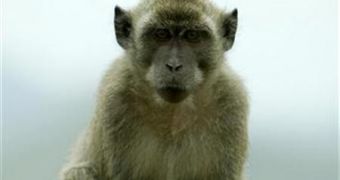Huntington's disease is an abnormal hereditary genetic mutation, currently incurable, which determines an increasingly fast deterioration of certain nerve cells in the brain. The disease itself is not lethal, although the complications are. The symptoms usually appear around middle age and manifest themselves through uncontrolled movement, emotional disturbances and mental deterioration, followed - in 10 to 15 years' time - by death.
Most of the times researchers use mice to study the biology of diseases, but because primates are more close to humans in neurological, genetic and physiological features, they preferred using laboratory animals in the study of Huntington's.
Emory University's Yerkes National Primate Research Center scientists revealed that they had created monkeys genetically modified to have Huntington's disease, in the hope that studying them would provide more insight into the dynamics of the disease and how to fight it with drugs. This is the first time a primate is genetically altered to bear a disease characteristic to humans.
"Rodent species can capture some of the characteristics of the disease, but they have not been satisfactory in being able to really capture the essence of the disease. Now we have a genetically modified nonhuman primate that really has captured the clinical signs that we see in patients with Huntington's disease", Stuart Zola from the Yerkes center.
Additionally, Huntington's disease was chosen in the experiment because the mutation involves a single gene, as opposed to other diseases that affect multiple genes. Studying such a simple mutation could eventually lead to creating monkeys with other neurodegenerative diseases such as Parkinson's and Alzheimer's.
"This research allows scientists to advance beyond mouse models, which do not replicate all of the changes in the brain and behavior that humans with Huntington's disease experience", said John Harding, a primate resources official at the National Institutes of Health.
With the help of the viral vector technology, the researchers have modified a monkey egg to bear Huntington's gene. The egg was then used to fertilize a female monkey. Five monkeys were born, out of which two died in less than a day, another after a month, while other two are still alive. One of the 10 month old monkeys is already starting to show the symptoms of the disease, while the other seems to be fine and may experience them much later in life, said Anthony Chan from Yerkes center and Emory University School of Medicine.

 14 DAY TRIAL //
14 DAY TRIAL //